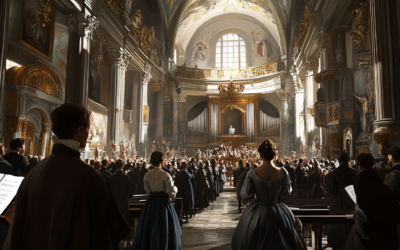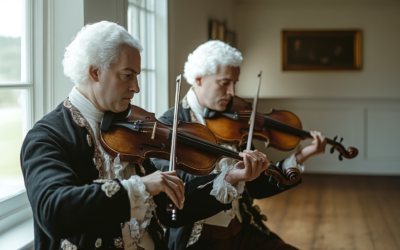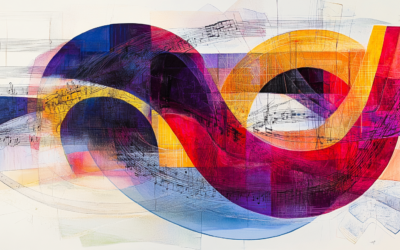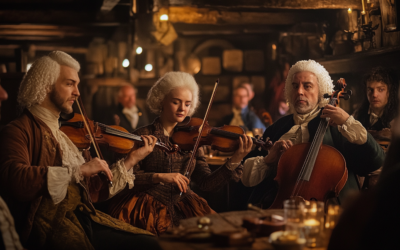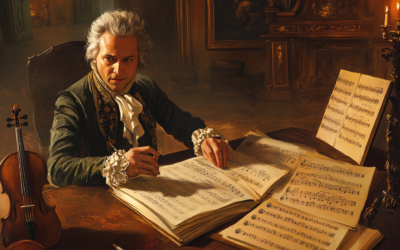Mozart and Salieri
Pushkin’s Drama of Genius and Malice
Pushkin does not see Salieri as a mere mediocre. In fact, Salieri embodies the struggle of the artist, much like Michelangelo, who reaches greatness through relentless effort. Pushkin himself identifies with both Mozart and Salieri, but he emphasises that true art demands work, discipline, and sacrifice. In poisoning the Mozartian element within himself, Salieri performs a service to art, freeing it from the frivolity of effortless genius. ‘Can genius and malice coexist?’ Pushkin’s answer is complex, but in the end, Salieri’s act seems to affirm that true creation lies in the hands of those who strive.
Mozart: The Fall of the Gods
This book compiles the results of our studies on 18th-century music and Mozart, who has been revered for over two centuries as a deity. We dismantle the baseless cult of Mozart and strip away the clichés that falsely present him as a natural genius, revealing the contradictions in conventional biographies. In this work, divided into two parts, we identify and critically analyze several contradictory points in the vast Mozart bibliography. Each of the nearly 2,000 citations is meticulously sourced, allowing readers to verify the findings. This critical biography of Mozart emerges from these premises, addressing the numerous doubts raised by researchers.
"O God! Where is your justice when the sacred gift, the immortal genius, illuminates a madman, an idle vagabond?"
Mozart: The Fall of the Gods
On 27 January 1832, Aleksandr Sergeyevich Pushkin (1799–1837) presented an enigmatic and intense story with his play Mozart and Salieri. The plot derives from a letter by Giuseppe Carpani, who defended Salieri and dismissed the poisoning rumour as pure fabrication. However, Pushkin’s drama transcends this legend to deliver a sharp and intriguing reflection on the nature of genius, hard work, and envy.
In the second scene of the drama, Mozart speaks to Salieri, stating that Beaumarchais is “a genius like you and me,” suggesting a connection between them as “sons of harmony.” Pushkin positions Salieri and Mozart as equals, both touched by the divine gift of music. Salieri, however, appeals to God, comparing himself to his master, Christoph Willibald Gluck, and asserting that he has “reached a high degree in the infinite art.” Despite this, Salieri is visibly disturbed by Mozart’s carefree nature and apparent lack of effort in achieving his talent.
Pushkin’s portrayal reflects the widespread fame of Salieri, who was highly respected across Europe, including Russia. The play’s first scene sees Salieri reflecting on the injustice of the world. He had dedicated his life to music, achieving success through hard work and perseverance, yet he envies Mozart. Unlike Salieri, Mozart appears frivolous, effortless, and unaware of the greatness attributed to him.
“O God! Where is your justice when the sacred gift, the immortal genius, is not sent as a reward for burning love, self-sacrifice, effort, patience, and supplication, but instead illuminates a madman, an idle vagabond?”
Mozart’s arrival in the scene only deepens Salieri’s frustration. He brings along a blind violinist, mocking an aria from The Marriage of Figaro, much to Salieri’s horror. Mozart’s carefree nature, in stark contrast to Salieri’s reverence for the art, leads Salieri to a moment of critical judgement. Although captivated by the beauty of Mozart’s new composition, Salieri cannot reconcile the genius of Mozart with what he perceives as a lack of appreciation for his own gift. In a chilling decision, Salieri resolves to poison Mozart.
During their dinner in the second scene, Mozart confides in Salieri about a mysterious commission for a Requiem, convinced that he is composing it for himself. This melancholic atmosphere reflects the tension between the two men. Mozart praises Salieri’s Tarare, an opera written in 1787, and here Pushkin creates a drama within the drama. Beaumarchais had rejected Mozart for the composition of Tarare, opting instead for Salieri—a decision that deeply affected Mozart.
The opera Tarare itself tells the story of a man who rises through the ranks with hard work and dedication, echoing Salieri’s own life journey. Meanwhile, the king, jealous of Tarare’s success, plots against him. The thematic parallels between Tarare and the relationship between Salieri and Mozart are clear: Salieri sees himself as the hard-working hero who deserves success, while Mozart, in his view, is the capricious favourite of the gods.
When Mozart asks Salieri whether Beaumarchais had ever poisoned anyone, the answer is a chilling foreshadowing of what is to come. As the conversation continues, Salieri secretly poisons Mozart’s drink while wrestling with the question, “Can genius and malice coexist?” The play concludes with Salieri alone, questioning whether he has done the right thing. He draws a parallel to Michelangelo, who was rumoured to have committed murder in order to paint his famous Pietà.
Pushkin cleverly invites the audience to reflect on the irrationality of the rumours surrounding Salieri, just as those about Michelangelo. If one accusation is false, then perhaps so is the other. If true, however, it only solidifies Salieri’s position as a genius on par with the Renaissance master. Pushkin’s commentary highlights the absurdity of blindly accepting slander, and yet, history did exactly that. Salieri’s reputation suffered immensely, fuelled by nationalist and later Nazi propaganda, which perpetuated these calumnies.
The figure of Salieri, as portrayed by Pushkin, embodies the classical ideal of hard work and reason, in direct contrast to Mozart’s supposed divine inspiration and natural talent. Scholars like Mikhail Gershenzon have argued that Salieri’s act of murder is symbolic: by killing Mozart, he kills the notion of innate genius and replaces it with the supremacy of human effort and reason. In doing so, Salieri asserts himself as the true creator, the Promethean figure who steals the fire of inspiration from the gods.
Pushkin sympathises with both characters but clearly dedicates more space to the introspection of Salieri, portraying him as a tragic hero. Salieri’s challenge to God’s injustice—where talent is bestowed without effort—is not merely the murder of Mozart, the man, but an assault on the very idea that genius can exist without hard work and sacrifice.
In the end, Mozart and Salieri is not simply a tale of jealousy or murder but a profound exploration of the nature of art, genius, and the human struggle against divine intervention. Pushkin masterfully leaves the audience pondering whether Salieri’s act is justifiable in the face of an unjust world, or whether, in killing Mozart, Salieri has also destroyed himself.
You May Also Like
The Questionable Attribution of Mozart’s Offertorium K.34
Attributing Offertorium K.34 to Mozart is not just misleading, it reflects the careless methods used by 19th-century scholars to inflate his legacy. Without an autograph or solid evidence, this work should not be considered part of his output.”
The Mysterious Case of Mozart’s Duets: An Unfinished Story
Mozart’s string duets have long been shrouded in mystery, from his father’s heavy influence in 1768 to his supposed act of charity for a dying Michael Haydn in 1783. These unfinished works reveal more about the composer’s life and struggles than they do about his musical genius.
The Misattribution of Mozart’s K.2 89a (K.6 73i): A Questionable Canon
K.2 89a (K.6 73i), attributed to Mozart, is riddled with issues—missing voices, incomplete harmonies, and even the absence of text. Should this piece really be in his catalogue?
The Borrowed Simplicity: Mozart’s Canons K.555, K.557, and K.562
The canons K.555, K.557, and K.562, often overlooked for their simplicity, reveal striking similarities with the works of Antonio Caldara. These three pieces, dated 1788, demonstrate how Mozart adapted and simplified Caldara’s contrapuntal structures, masking his influences while reflecting the galant style of the era.
Mozart’s Quartet of Lodi: A Dated Work with Many Influences
Mozart’s Quartet of Lodi is often praised as an early masterpiece. But was it really his own work?
Mozart’s Violin Pieces: Substitutes for Failed Movements?
Despite revisions, Mozart’s violin concertos remain flawed, while his minor pieces, K.261 and K.373, surprisingly garner more attention in his correspondence than his major works.


